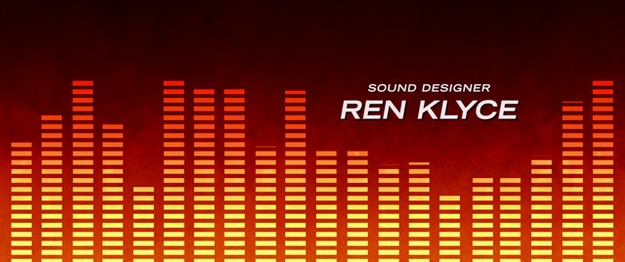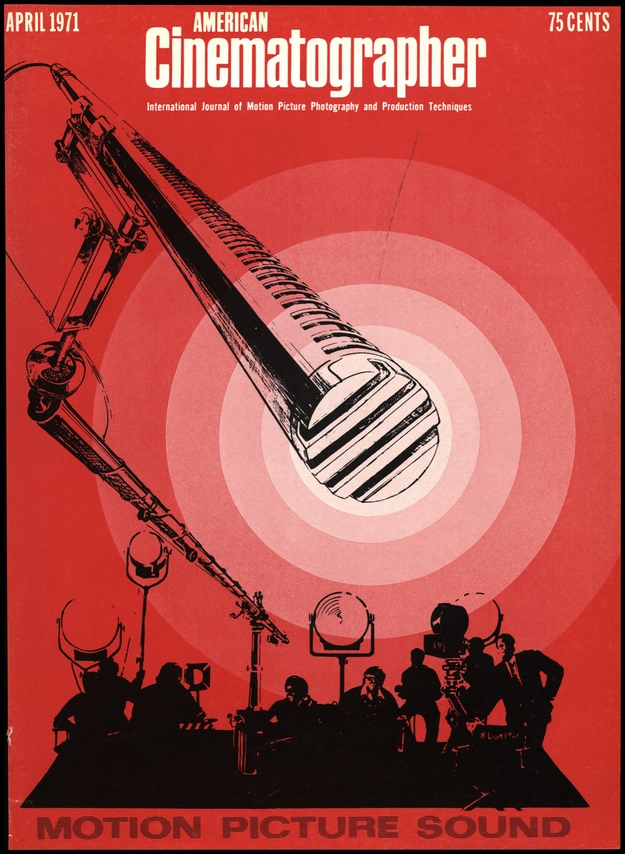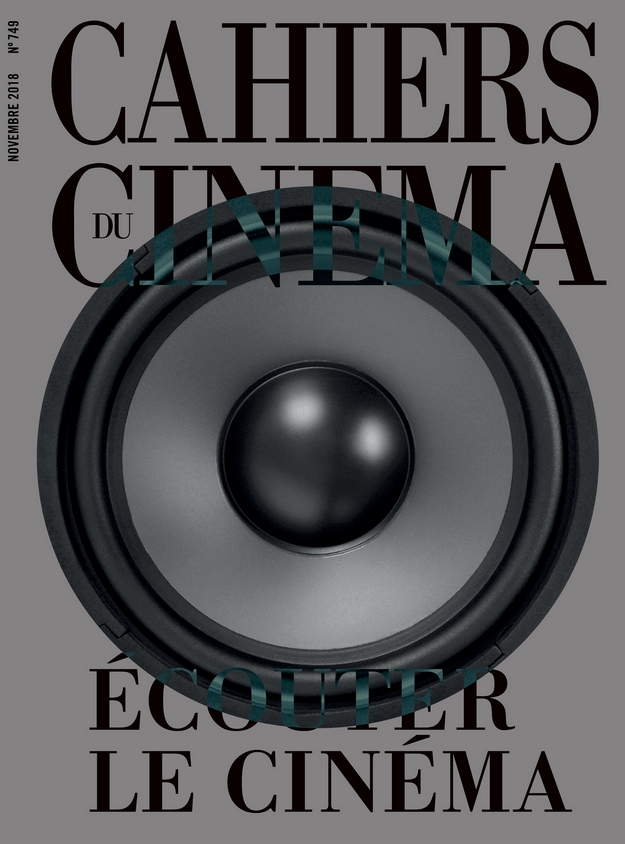
Les sons de Paul Thomas Anderson © Little White Lies
Les sons de Wes Anderson © Little White Lies
Les sons de David Fincher © Little White Lies
Les sons de Robert Eggers © Little White Lies

Oscars du meilleur mixage de son
L’Oscar du meilleur mixage de son (Academy Award for Best Sound Mixing) est décerné depuis 1930 (le cinéma parlant n'étant pas encore assez répandu avant cette date) par l'Academy of Motion Picture Arts and Sciences.
Ce prix récompense le travail d'enregistrement et de mixage des techniciens du son. Une autre catégorie a récompensé de 1964 à 2020 les meilleures créations sonores : l'Oscar du meilleur montage de son (voir ci-dessous).
Les années indiquées ci-dessous sont les années de remise de l'Oscar, et non les années de sortie des films aux États-Unis (qui a lieu l'année précédente).
• 1930 (novembre) : Douglas Shearer pour "Big House"
• 1931 : Paramount Publix Studio Sound Department
• 1932 : Paramount Publix Studio Sound Department
• 1934 : Franklin B. Hansen pour "L'Adieu aux armes"
• 1935 : John Livadary pour "Une nuit d'amour"
• 1936 : Douglas Shearer pour "La Fugue de Mariette"
• 1937 : Douglas Shearer pour "San Francisco"
• 1938 : Thomas T. Moulton pour "The Hurricane"
• 1939 : Thomas T. Moulton pour "Madame et son cowboy"
• 1940 : Bernard B. Brown pour "Veillée d’amour"
• 1941 : Douglas Shearer pour "En avant la musique"
• 1942 : Jack Whitney pour "Lady Hamilton"
• 1943 : Nathan Levinson pour "La Glorieuse Parade"
• 1944 : Stephen Dunn pour "Vivre libre"
• 1945 : Edmund H. Hansen pour "Le Président Wilson"
• 1946 : Stephen Dunn pour "Les Cloches de Sainte-Marie"
• 1947 : John Livadary pour "Le Roman d'Al Jolson"
• 1948 : Gordon Sawyer pour "Honni soit qui mal y pense"
• 1949 : Thomas T. Moulton pour "La Fosse aux serpents"
• 1950 : Thomas T. Moulton pour "Un homme de fer"
• 1951 : Thomas T. Moulton pour "Ève"
• 1952 : Douglas Shearer pour "Le Grand Caruso"
• 1953 : London Films pour "Le Mur du son"
• 1954 : John P. Livadary pour "Tant qu'il y aura des hommes"
• 1955 : Leslie I. Carey pour "Romance inachevée"
• 1956 : Fred Hynes pour "Oklahoma !"
• 1957 : Carl Faulkner pour "Le Roi et moi"
• 1958 : George Groves pour "Sayonara"
• 1959 : Fred Hynes pour "South Pacific"
• 1960 : Franklin E. Milton pour "Ben-Hur"
• 1961 : Fred Hynes et Gordon E. Sawyer pour "Alamo"
• 1962 : Gordon E. Sawyer et Fred Hynes pour "West Side Story"
• 1963 : John Cox pour "Lawrence d'Arabie" (Royaume-Uni)
• 1964 : Franklin E. Milton pour "La Conquête de l'Ouest"
• 1965 : George R. Groves pour "My Fair Lady"
• 1966 : James P. Corcoran pour "La Mélodie du bonheur"
• 1967 : Franklin E. Milton pour "Grand Prix"
• 1968 : Samuel Goldwyn Studio pour "Dans la chaleur de la nuit"
• 1969 : Shepperton Studio pour "Oliver !"
• 1970 : Jack Solomon et Murray Spivack pour "Hello, Dolly!"
• 1971 : Douglas Williams et Don Bassman pour "Patton"
• 1972 : Gordon McCallum et David Hildyard pour "Un violon sur le toit"
• 1973 : Robert Knudson et David Hildyard pour "Cabaret"
• 1974 : Robert Knudson et Chris Newman pour "L'Exorciste"
• 1975 : Ronald Pierce et Melvin Metcalfe Sr. pour "Tremblement de terre"
• 1976 : Robert Hoyt, Roger Heman, Earl Madery et John Carter pour "Les Dents de la mer"
• 1977 : Arthur Piantadosi, Les Fresholtz, Dick Alexander et Jim Webb pour "Les Hommes du président"
• 1978 : Don MacDougall, Ray West, Bob Minkler et Derek Ball pour "La Guerre des étoiles"
• 1979 : Richard Portman, William McCaughey, Aaron Rochin et Darin Knight pour "Voyage au bout de l'enfer"
• 1980 : Walter Murch, Mark Berger, Richard Beggs et Nat Boxer pour "Apocalypse Now"
• 1981 : Bill Varney, Steve Maslow, Gregg Landaker et Peter Sutton pour "L'Empire contre-attaque"
• 1982 : Bill Varney, Steve Maslow, Gregg Landaker et Roy Charman pour "Les Aventuriers de l'arche perdue"
• 1983 : Robert Knudson, Robert Glass, Don Digirolamo et Gene Cantamessa pour "E.T. l'extra-terrestre"
• 1984 : Mark Berger, Tom Scott, Randy Thom et David MacMillan pour "L'Étoffe des héros"
• 1985 : Mark Berger, Tom Scott, Todd Boekelheide et Chris Newman pour "Amadeus"
• 1986 : Chris Jenkins, Gary Alexander, Larry Stensvold et Peter Handford pour "Out of Africa"
• 1987 : John K. Wilkinson, Richard Rogers, Charles "Bud" Grenzbach et Simon Kaye pour "Platoon"
• 1988 : Bill Rowe et Ivan Sharrock pour "Le Dernier Empereur" (Italie/Chine/Royaume-Uni)
• 1989 : Les Fresholtz, Dick Alexander, Vern Poore et Willie Burton pour "Bird"
• 1990 : Donald Mitchell, Gregg Rudloff, Elliot Tyson et Russell Williams pour "Glory"
• 1991 : Jeffrey Perkins, Bill Benton, Greg Watkins et Russell Williams pour "Danse avec les loups"
• 1992 : Gary Rydstrom, Gary Summers, Tom Johnson et Lee Orloff pour "Terminator 2 : Le Jugement dernier"
• 1993 : Chris Jenkins, Doug Hemphill, Mark Smith et Simon Kaye pour "Le Dernier des Mohicans"
• 1994 : Gary Rydstrom, Gary Summers, Shawn Murphy et Ron Judkins pour "Jurassic Park"
• 1995 : Gregg Landaker, Steve Maslow, Bob Beemer et David MacMillan pour "Speed"
• 1996 : Rick Dior, Steve Pederson, Scott Millan et David MacMillan pour "Apollo 13"
• 1997 : Walter Murch, Mark Berger, David Parker et Chris Newman pour "Le Patient anglais"
• 1998 : Gary Rydstrom, Gary Summers, Tom Johnson et Mark Ulano pour "Titanic"
• 1999 : Gary Rydstrom, Gary Summers, Andy Nelson et Ronald Judkins pour "Il faut sauver le soldat Ryan"
• 2000 : John Reitz, Gregg Rudloff, David Campbell et David Lee pour "Matrix"
• 2001 : Scott Millan, Bob Beemer et Ken Weston pour "Gladiator"
• 2002 : Michael Minkler, Myron Nettinga et Chris Munro pour "La Chute du faucon noir"
• 2003 : Michael Minkler, Dominic Tavella et David Lee pour "Chicago"
• 2004 : Christopher Boyes, Michael Semanick, Michael Hedges et Hammond Peek pour "Le Retour du roi"
• 2005 : Scott Millan, Greg Orloff, Bob Beemer et Steve Cantamessa pour "Ray"
• 2006 : Christopher Boyes, Michael Semanick, Michael Hedges et Hammond Peek pour "King Kong"
• 2007 : Michael Minkler, Bob Beemer et Willie D. Burton pour "Dreamgirls"
• 2008 : Kirk Francis, Scott Millan et David Parker pour "La Vengeance dans la peau"
• 2009 : Resul Pookutty, Richard Pryke et Ian Tapp pour "Slumdog Millionaire" (Royaume-Uni)
• 2010 : Paul N.J. Ottosson et Ray Beckett pour "Démineurs"
• 2011 : Lora Hirschberg, Gary A. Rizzo et Ed Novick pour "Inception"
• 2012 : Tom Fleischman et John Midgley pour "Hugo Cabret"
• 2013 : Andy Nelson, Mark Paterson et Simon Hayes pour "Les Misérables" (Royaume-Uni)
• 2014 : Skip Lievsay, Niv Adiri, Christopher Benstead et Chris Munro pour "Gravity"
• 2015 : Craig Mann, Ben Wilkins et Thomas Curley pour "Whiplash"
• 2016 : Chris Jenkins, Gregg Rudloff et Ben Osmo pour "Mad Max: Fury Road"
• 2017 : Kevin O'Connell, Robert McKenzie, Andy Wright et Peter Grace pour "Tu ne tueras point"
• 2018 : Mark Weingarten, Gregg Landaker et Gary A. Rizzo pour "Dunkerque"
• 2019 : Paul Massey, Tim Cavagin et John Casali pour "Bohemian Rhapsody"
• 2020 : Mark Taylor et Stuart Wilson pour "1917"
• 2021 : Nicolas Becker, Jaime Baksht, Michelle Couttolenc, Carlos Cortes et Philip Bladh pour "Sound of Metal"
• 2022 : Mac Ruth, Mark A. Mangini, Theo Green, Doug Hemphill et Ron Bartlett pour "Dune"
• 2023 : Mark Weingarten, James Mather, Al Nelson, Chris Burdon et Mark Taylor pour "Top Gun: Maverick"
• 2024 : Tarn Willers et Johnnie Burn pour "La Zone d'intérêt"
• 2025 : Gareth John, Richard King, Ron Bartlett et Doug Hemphill pour "Dune, deuxième partie"
Oscars du meilleur montage de son
L’Oscar du meilleur montage de son (Academy Award for Best Sound Editing) a été décerné de 1964 à 2020 par l'Academy of Motion Picture Arts and Sciences.
Cette récompense était née de la scission de la catégorie Meilleurs effets spéciaux en Meilleurs effets visuels et Meilleurs effets sonores (ou montage de son). Entre 1976 et 1988, l'AMPAS décerna ponctuellement un Oscar pour une contribution spéciale (Oscar d'honneur) avant que la catégorie ne redevienne compétitive.
Ce prix récompensait le travail de création des techniciens du son. Une catégorie parallèle récompense le Meilleur mixage de son depuis 1930 (voir ci-dessus).
Les années indiquées ci-dessous sont les années de remise de l'Oscar, et non les années de sortie des films aux États-Unis (qui a lieu l'année précédente).
• 1964 : Walter G. Elliott pour "Un monde fou, fou, fou, fou"
• 1965 : Norman Wanstall pour "Goldfinger"
• 1966 : Tregoweth Brown pour "La Grande Course autour du monde"
• 1967 : Gordon Daniel pour "Grand Prix"
• 1968 : John Poyner pour "Les Douze Salopards"
• 1969 : non attribué
• 1970 : non attribué
• 1971 : non attribué
• 1972 : non attribué
• 1973 : non attribué
• 1974 : non attribué
• 1975 : non attribué
• 1976 : Peter Berkos pour "L'Odyssée du Hindenburg" *
• 1977 : non attribué
• 1978 : Frank Warner pour "Rencontres du troisième type" *
• 1979 : non attribué
• 1980 : Alan Splet pour "L'Étalon noir" *
• 1981 : non attribué
• 1982 : Ben Burtt et Richard Anderson pour "Les Aventuriers de l'arche perdue" *
• 1983 : Ben Burtt et Charles Campbell pour "E.T. l'extra-terrestre"
• 1984 : Jay Boekelheide pour "L'Étoffe des héros"
• 1985 : Kay Rose pour "La Rivière" *
• 1986 : Charles Campbell et Robert Rutledge pour "Retour vers le futur"
• 1987 : Don Sharpe pour "Aliens, le retour"
• 1988 : Stephen Flick et John Pospisil pour "RoboCop" *
• 1989 : Charles Campbell et Louis Edemann pour "Qui veut la peau de Roger Rabbit ?"
• 1990 : Ben Burtt et Richard Hymns pour "Indiana Jones et la dernière croisade"
* Special Achievement Award
• 1991 : Cecelia Hall et George Watters II pour "À la poursuite d'Octobre Rouge"
• 1992 : Gary Rydstrom et Gloria Borders pour "Terminator 2 : Le Jugement dernier"
• 1993 : Tom McCarthy et David Stone pour "Dracula"
• 1994 : Gary Rydstrom et Richard Hymns pour "Jurassic Park"
• 1995 : Stephen Hunter Flick pour "Speed"
• 1996 : Lon Bender et Per Hallberg pour "Braveheart"
• 1997 : Bruce Stambler pour "L'Ombre et la Proie"
• 1998 : Tom Bellfort et Christopher Boyes pour "Titanic"
• 1999 : Gary Rydstrom et Richard Hymns pour "Il faut sauver le soldat Ryan"
• 2000 : Dane Davis pour "Matrix"
• 2001 : Jon Johnson pour "U-571"
• 2002 : George Watters II et Christopher Boyes pour "Pearl Harbor"
• 2003 : Ethan Van der Ryn et Michael Hopkins pour "Les Deux Tours"
• 2004 : Richard King pour "Master and Commander"
• 2005 : Michael Silvers et Randy Thom pour "Les Indestructibles" (animation)
• 2006 : Mike Hopkins et Ethan Van der Ryn pour "King Kong"
• 2007 : Alan Robert Murray et Bub Asman pour "Lettres d'Iwo Jima"
• 2008 : Karen Baker Landers et Per Hallberg pour "La Vengeance dans la peau"
• 2009 : Richard King pour "The Dark Knight"
• 2010 : Paul N.J. Ottosson pour "Démineurs"
• 2011 : Richard King pour "Inception"
• 2012 : Philip Stockton et Eugene Gearty pour "Hugo Cabret"
• 2013 : Per Hallberg et Karen Baker Landers pour "Skyfall" et Paul N.J. Ottosson pour "Zero Dark Thirty" ex æquo
• 2014 : Glenn Freemantle pour "Gravity"
• 2015 : Alan Robert Murray et Bub Asman pour "American Sniper"
• 2016 : Mark A. Mangini et David White pour "Mad Max: Fury Road"
• 2017 : Sylvain Bellemare pour "Premier contact"
• 2018 : Richard King et Alex Gibson pour "Dunkerque"
• 2019 : John Warhurst et Nina Hartstone pour "Bohemian Rhapsody"
• 2020 : Donald Sylvester pour "Le Mans 66"

